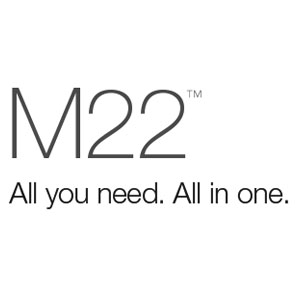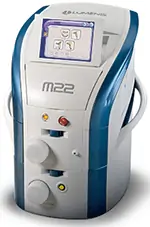
Non-Surgical Technology
M22 IPL / Photorejuvenation
Also known as intense pulsed light or photo facial
A clear complexion is something many people want, but even with the most meticulous skincare regimen, blemish-free skin can be difficult to achieve. Photorejuvenation, which uses Intense Pulsed Light (IPL) technology, can help reduce the appearance of some of the most common skin woes, including brown spots, melasma, broken capillaries and sun spots. This minimally invasive skin procedure can also treat signs of aging such as wrinkles or age spots. There’s very little recovery time and few side effects, making it a popular procedure.
When to Consider IPL / Photorejuvenation
- If you want to improve the look of your skin without undergoing a full surgical procedure
- If you have redness, brown spots or scarring on your skin
- If you would like to reduce pore size, fine wrinkles and improve skin texture
Considerations
Pros
- Little to no downtime
- Relatively long-lasting improvements in skin quality and texture can be achieved
- Can be performed anywhere on the body
Cons
- Several treatments may be required before full effects are seen
- Not as effective for tanned or darker skin
- Must stay out of the sun after each treatment
These are the top three pros and cons to weigh when considering IPL / photorejuvenation. If you want to focus on what is unique to you, please consult with your aesthetic plastic surgeon.
Are you a good candidate for a IPL / photorejuvenation?
If you are routinely frustrated by any of the skin problems below, then photorejuvenation can be a good choice:
- Rosacea
- Hyperpigmentation (brown spots)
- Wrinkles
- Texture problems
- Large, visible pores
- Melasma
- Excessive flushing
- Freckles
- Age and sun spots
- Broken capillaries
- Spider veins
- Stretch marks
If you are in good general health, have a positive attitude and realistic expectations, you are most likely a good candidate for this procedure.
Detailed Procedural Info
Photorejuvenation uses a unique technique known as pulsed light therapy to treat skin blemishes. Essentially, this technology shines bright, intense light on various parts of the skin. You will wear an eye mask to protect your eyes from the light, and your doctor will use a piece of equipment called an IPL device, which includes an apparatus with a glass or laser surface. This apparatus is pressed to the problematic areas of the body, emitting a light that heats up collagen beneath the skin, encouraging the body to produce more of this beneficial protein. Enhanced collagen production can fill in fine lines or wrinkles on the face as well as some shallow acne scars. IPL technology also reduces flushing and discoloration on the skin.
Your plastic surgeon may also recommend complementary treatments to help you achieve your goal. Sometimes the use of laser skin resurfacing or a chemical peel in conjunction with photorejuvenation will provide the best result.
IPL emits a broad range of light waves and can diffuse redness, capillaries, brown spots, discoloration and remove hair.
What does IPL or photorejuvenation feel like?
Photorejuvenation may cause mild discomfort. Many patients liken the feeling to a rubber band being snapped against the skin.
Selecting a Surgeon
It’s important to choose your surgeon based on:
- Education, training, and certification
- Experience with photorejuvenation
- Your comfort level with him or her
After finding a board-certified plastic surgeon in your area who is experienced in performing photorejuvenation, you will need to make an office appointment to set up your consultation. Generally, because of the in-depth nature of the consultation, there is a cost associated with the initial visit.
Your initial consultation appointment
During your initial consultation, your plastic surgeon will examine your skin and discuss what issues may be improved by photorejuvenation. Your doctor will also design a treatment plan specifically for your skin issues, which will include an estimated number of treatments to achieve maximum results. Understanding your goals and medical condition, both alternative and additional treatments may be considered.
You should come to the consultation prepared to discuss your complete medical history. This will include information about:
- Previous surgeries
- Past and present medical conditions
- Allergies and current medications
Your treatment plan
Based on your goals, physical characteristics, and the surgeon’s training and experience, your surgeon will share recommendations and information with you, including:
- An approach to your treatment, including the type of procedure or combination of procedures
- The outcomes that you can anticipate
- Your financial investment in the procedure
- Associated risks and complications
- Options for anesthesia and treatment location
- What you need to prepare for your treatment
- What you can expect to experience after treatment
- Before-and-after photos of cases similar to yours and answer any questions
Questions to ask your aesthetic plastic surgeon
For a general list of questions to ask your surgeon about his or her background, to find out about plastic surgery safety, and to plan your procedure. We developed these questions to help you:
- Make the most informed and intelligent decision about your procedure
- Confirm that you have the right surgeon for your procedure
- Make your initial consultation as rewarding as possible
- Understand your options, potential outcomes, and risks
It is important for you to take an active role in your treatment, so please use this list of questions as a starting point for your initial consultation.
- Am I a good candidate for IPL/photorejuvenation?
- Are the results I am seeking reasonable and realistic?
- Do you have before-and-after photos I can look at for the procedure I am undergoing?
- Will I have any scarring?
- What kind of anesthesia do you recommend for me?
- What will be the costs associated with my treatment?
- What will you expect of me to get the best results?
- What kind of recovery period can I expect, and when can I resume normal activities?
- What are the risks and complications associated with my procedure?
- How are complications handled?
- What are my options if the cosmetic outcome of my treatment does not meet the goals we agreed on?
Preparing for Your Procedure
Your surgeon will provide thorough pretreatment instructions, answer any questions you may have, take a detailed medical history, and perform a physical exam to determine your fitness for treatment.
In advance of your procedure, your surgeon will ask you to:
- Moisturize regularly, avoid too much exposure to the sun, and wear sunscreen with SPF 30 or higher
- Stop smoking at least six weeks before undergoing surgery to promote better healing
- Avoid taking aspirin, certain anti-inflammatory drugs, and some herbal medications that can cause increased bleeding
- Refrain from taking certain antibiotics and topical creams such as retinoids (Retin-A) that affect skin sensitivity
- If you are living with the herpes virus, your plastic surgeon may ask you to take antiviral medication to reduce the chance of an outbreak on the day of the procedure.
- Regardless of the type of surgery to be performed, hydration is very important before and after treatment for safe recovery.
The morning before your photorejuvenation procedure, you should not apply any makeup or skincare products. Your face will need to be thoroughly cleansed before the treatment can begin, but this may be done at the office before treatment. It’s possible that your doctor will apply a topical anesthetic prior to treatment.
Photorejuvenation is usually performed on an outpatient basis. Be sure to arrange for someone to drive you home after treatment and to stay with you at least the first night.
What can I expect on the day of IPL/photorejuvenation treatment?
Your photorejuvenation treatment may be performed in an accredited hospital, free-standing ambulatory facility, or office-based surgical suite. Most photorejuvenation procedures take at least twenty to thirty minutes, depending on the number and types of blemishes being treated but may take longer.
- Medications are administered for your comfort during the procedure.
- A topical gel or forced cool air may be used to keep your skin from feeling too much heat.
- For your safety, various monitors may be used to check your heart, blood pressure, pulse, and the amount of oxygen circulating in your blood.
- Your surgeon will follow the treatment plan discussed with you.
- After your procedure is completed, you will be taken into a recovery area where you will continue to be closely monitored.
- You will probably be permitted to go home after a short observation period unless you and your plastic surgeon have made other plans for your immediate post-treatment recovery.
Aftercare and Recovery
Your surgeon will discuss how long it will be before you can return to your normal level of activity and work. After surgery, you and your caregiver will receive detailed instructions about your postsurgical care, including information about:
- Normal symptoms you will experience
- Potential signs of complication
Immediately after the procedure
Immediately following the procedure, you may feel as though you have a sunburn, though this feeling will subside within twenty-four hours. Typically, patients experience no side effects within one to two days of the procedure. Though it’s unlikely, some scabs or blisters may appear after a photorejuvenation treatment, and these should not be picked at. Your doctor may advise you to avoid hot water and prolonged sun exposure for up to two days following your procedure. Any other instructions your doctor provides should be followed for maximum results with minimal side effects.
Recovery time frame after IPL / photorejuvenation
Though most physical side-effects will subside within forty-eight hours, patients may find that the blemishes on their skin darken for a period of up to two weeks. This is because the skin needs to shed for the results to be visible. Eventually skin blemishes will fade to a lighter appearance than before the treatment.
Your surgeon will also provide detailed instructions about the normal symptoms you will experience and any potential signs of complications. It is important to realize that the amount of time it takes for recovery varies greatly among individuals.
How Long Will the Results Last?
The length of your photorejuvenation results will depend largely on the types of blemishes you are treating, as well as how large of an area or how many areas you wish to improve. For basic IPL treatments, most patients will need to undergo two to six procedures spaced four weeks apart.
Photorejuvenation can often significantly reduce issues such as brown spots, flushing, or spider veins for a long period of time. However, the procedure does not stop the skin from aging, so it’s possible that new wrinkles or blemishes will appear over time. For this reason, some patients choose to undergo pulsed light therapy multiple times over a period of several years.
Maintain a relationship with your aesthetic plastic surgeon
For safety, as well as the most beautiful and healthy outcome, it’s important to return to your plastic surgeon’s office for follow-up evaluation at prescribed times and whenever you notice any changes in your skin. Do not hesitate to contact your surgeon when you have any questions or concerns.
Associated Costs
The cost of IPL or photorejuvenation varies from doctor to doctor and from one geographic area to another. Because photorejuvenation is elective, insurance usually does not cover these costs. However, occasionally, if the photorejuvenation is being performed to treat certain skin conditions or improve certain types of scars, insurance coverage may be available. Your plastic surgeon’s office will explain how you can find out from your insurance company if a particular procedure will be covered. Many surgeons offer patient financing plans to make the procedure more affordable.
Choose your surgeon based on quality, training, and experience—not cost.
Limitations and Risks
One of the reasons photorejuvenation is so popular is because it carries very few risks. Your specific risks will be discussed during your consultation.
All surgical procedures have some degree of risk. Some of the potential complications of all surgeries are:
- Adverse reaction to anesthesia
- Hematoma or seroma (an accumulation of blood or fluid under the skin that may require removal)
- Infection and bleeding
- Changes in sensation
- Scarring
- Allergic reactions
- Damage to underlying structures
- Unsatisfactory results that may necessitate additional procedures
Other risks specific to photorejuvenation are outlined below:
- Most patients will experience slight burning after the procedure, and some will see light scabbing, blistering, or crusting. These issues are normal and will typically subside within a few days, but if they persist it’s important that you get in touch with your surgeon.
- Very rarely, patients will experience bruising, slight bleeding, or scarring, but these issues typically only arise if treatments are spaced too closely together, or after excessive use of IPL technology.
- Individuals who are living with the herpes simplex virus may find that IPL treatments can induce an outbreak. Antiviral medication used to treat this condition can help reduce the chances of outbreaks prompted by photorejuvenation.
You can help minimize certain risks by following the advice and instructions of your board-certified plastic surgeon, both before and after your treatment.
Harake Plastic Surgery
Dr. Mazen Harake
1050 Wilshire Drive
Suite 100
Troy, Michigan 48084


